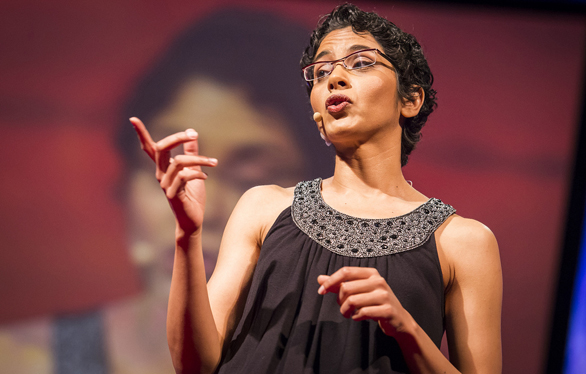
This image of Abha Dawesar at TEDGlobal 2013 gives an interesting illustration of her concept of the “digital now.” We see her … in front of the digital reflection of herself. Photo: James Duncan Davidson
How long have you been staring at a screen? Chances are this is not the beginning of your day on your mobile device or computer — and it’s very unlikely to be the end of it. You reading this blog post is only a moment in your digital day, nestled among Facebook updates, Twitter posts, Tumblr reblogs, YouTube videos and, of course, more articles.
 Abha Dawesar: Life in the "digital now"
You and I are operating in what today’s speaker Abha Dawesar calls the “digital now,” a stream of time that is parallel to the present, but also in competition with it.
Abha Dawesar: Life in the "digital now"
You and I are operating in what today’s speaker Abha Dawesar calls the “digital now,” a stream of time that is parallel to the present, but also in competition with it.
It’s becoming increasingly harder to pay full attention to the present, says Dawesar, a novelist. In this poetic talk, she looks at the dangers of our time- and space- warping technologies and what exactly happens when we blur the lines between the past, present and future.
“Technology has altered our flow of time … So many of us today have the sensation that time’s arrow is pointing everywhere and nowhere at once,” she warns. “Every digital landmark is an invitation to leave what you’re doing now and go somewhere else and do something else.”
Of course, Dawesar isn’t the only one thinking about the profound effects that technology has on our experiences. Many other researchers, writers and thinkers are pondering the positive and negative effects of a society immersed in the online world — and many of them are coming to different conclusions than Dawesar. Here is a collection of ideas, thoughts and questions that form the thought landscape of the wild, wild digital now. Go on, let these links be invitations to distraction:
“There is, for instance, a simple, spooky sense in which the Internet is just a loud and unlimited library in which we now live—as if one went to sleep every night in the college stacks, surrounded by pamphlets and polemics and possibilities. There is the sociology section, the science section, old sheet music and menus, and you can go to the periodicals room anytime and read old issues of the New Statesman. (And you can whisper loudly to a friend in the next carrel to get the hockey scores.)” —Adam Gopnik in The New Yorker piece, “The Information”
“I’m the kind of guy who falls asleep reading Twitter. At least once a month I get so caught up in an iPhone game I miss my subway stop. My love of the digital world has led me to a great career, but now it seemed my status as a tech-obsessed dad was hurting my son. When I bounced him on my lap and surfed the web, was that like second-hand smoke for his fragile young brain?” —Ben Popper of The Verge in the story “Is Technology Scrambling My Baby’s Brain?”
“Leisure time on the Internet is less about pursuing a singular interest than allowing it to be flooded by other, unrelated interests, a way of dosing your brain’s propensity to ask why by letting it binge on an infinite stream of questions and the digital puzzle pieces that can be assembled into something approximating an answer.” —Michael Thomsen of Complex Tech
“On the Net, we face many information faucets, all going full blast. Our little thimble overflows as we rush from tap to tap. We transfer only a small jumble of drops from different faucets, not a continuous, coherent stream.” —Nicholas Carr in the Wired story “The Web Shatters Focus, Rewires the Brain”
“Unsurprisingly, the time people spend on the computer ‘for leisure’ has increased exponentially in the last few years. However, computer leisure still comprises a mere 13 minutes of the five hours of leisure time the average American has in the day.” —Simone Foxman of The Atlantic in the article “What Would You Be Doing If You Spent Less Time Online?”
“Your worst fear is a black screen and a lost charger.” —Molly Horan of Mashable
“The lifetime over which data can be stored on magnetic discs is still about a decade. That raises an interesting problem. How are we to preserve information about our civilisation on a timescale that outlasts it? … Today, we get an answer…” —The MIT Technology Review look at “The Million-Year Data Storage Disk”
“Yes, the constant arrival of information packets can be distracting or addictive, especially to people with attention deficit disorder. But distraction is not a new phenomenon. The solution is not to bemoan technology but to develop strategies of self-control, as we do with every other temptation in life.” —Steven Pinker writes in The New York Times op-ed “Mind Over Mass Media”
“Today’s self-publishing tools, almost from the get-go, were designed to privilege the present and ignore the past. When blogs first became popular, they were all organized in reverse chronology, with the most recent post at the top, the older ones fading into the background, and the clear implication of that design is that what’s written today is more important than what was written last week or last year. That design has carried over into basically every tool of social media.” —Clive Thompson in an interview with The New Yorker
Comments (36)
Pingback: Τί είναι το “digital now” στις ζωές μας; | TEDxUniversityofMacedonia
Pingback: 5 Methods to Battle Again – ProActuary - Insurance
Pingback: Technology Addiction: 5 Ways to Fight Back - ProActuary
Pingback: 14 Blog Notes – NEW MEDIA DESIGN
Pingback: How constantly being on my iPhone has affected my understanding of time – All that jazz 2.0
Pingback: Τί είναι το “digital now” στις ζωές μας; – Blog
Pingback: The Digital Now, Not The Here And Now – adailey95
Pingback: Siri, Who Am I? – writingatlagcc
Pingback: TEDxUniversityofMacedonia Blog